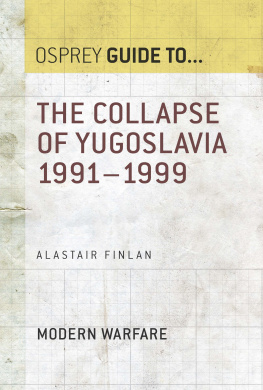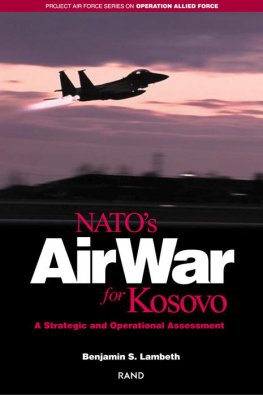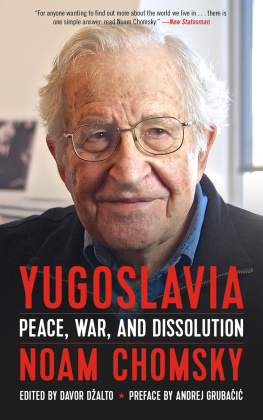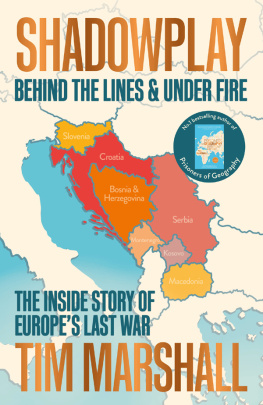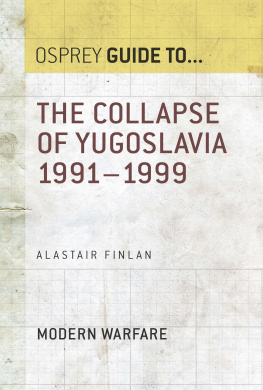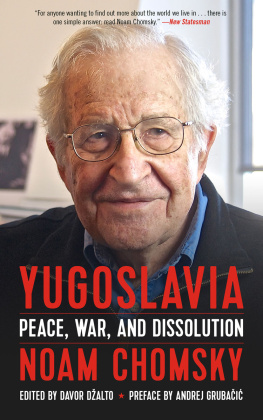Guide To
The Collapse of Yugoslavia
1991-1999
Alastair Finlan

Contents
Introduction
The collapse of Yugoslavia from 1991 to 1999 represents one of the greatest yet least understood tragedies of recent times. After the fall of the Berlin Wall and the end of the Cold War, the rest of Eastern Europe embraced with enthusiasm the opportunity to move forward beyond the ravages of communism. The Balkans, however, seemed to step backwards. The region seemed unable to shake off the history of conflict and violence which had oppressed it for so long it is often forgotten that Yugoslavia endured not only a German occupation but also a bitter civil war during World War Two, in which about one million people died. Perhaps, then, it was unsurprising (yet still shocking) that painful reminders of the brutality of World War Two, like concentration camps, should re-emerge in Yugoslavia some 50 years later. Estimates suggest that nearly a quarter of a million people died in the savage ethnic fighting during the 1990s, and the international community watched in disbelief as genocide found new life in a modern age. Unlike other recent wars, the fighting in Yugoslavia was not dominated by high technology and detachment from the enemy. Instead, people killed those they knew, neighbour versus neighbour, and often with short-range weapons such as rifles, knives, or in some cases, pitchforks. It was a return to a type of warfare that seemed medieval in comparison to state-of-the-art, satellite-guided bombs and cruise missiles that are the hallmarks of modern military operations.
The international effects of the bloody disintegration of Yugoslavia have been substantial, wide-ranging, and are still evident in contemporary global affairs. Millions of refugees fled from the region into other parts of Europe, with profound social and economic consequences for their host countries. The influx of refugees was not only an unwelcome financial burden, but also sparked unrest in countries that were forced to absorb people with a completely different set of norms and values. Multi-national operations involving thousands of stabilisation troops and billions of dollars in expenditure are still ongoing in Bosnia-Hercegovina, Kosovo and Macedonia. The crimes committed during the fighting are even now being brought to justice through the International Criminal Tribunal for the Former Yugoslavia (ICTY), set up in 1993 at The Hague to address the serious violations of international humanitarian law.
The events in Yugoslavia in the 1990s possess an enigmatic quality. At the heart of the debate is the question of how people who have lived for years in peace can suddenly start killing each other in the most barbaric ways. Surely humanity at the latter end of the twentieth century had evolved beyond such practices, condemned by the international community after World War Two?
The suffering in the Balkans thrust several key international figures into the limelight, whose reputations were largely sullied by either direct involvement in the killings, or their inability to generate a comprehensive solution to the crisis. Overnight, a little-known Serbian leader, Slobodan Milosevic, became a household name across the world. Many historians believe that Milosevic was a central figure in the outbreak of fighting between the different ethnic communities, yet throughout the 1990s the international community was more than willing to negotiate with Milosevic as a legitimate authority rather than as a perpetrator of violence.
Milosevics Bosnian Serb partners, the flamboyant Radovan Karadzic and his ruthless military compatriot General Ratko Mladic, also face indictments for alleged war crimes, but remain at large at the time of writing. Other regional leaders, such as Franjo Tudjman of Croatia and Alija Izetbegovic of Bosnia-Hercegovina, became equally well known in the global media, but with less notoriety than their Serbian counterparts. For the wider international community, unlike previous crises such as the Gulf War of 1991, no single international leader (until President Bill Clinton in 1995) took the lead concerning policy towards the former Yugoslavia. However, some political analysts have raised serious questions about the role of the British leader John Major and his Foreign Secretary, Douglas Hurd, in ensuring that the European Community did not become too heavily involved at the outset of the fighting. By contrast, John Majors successor, Tony Blair, played a central part in ensuring swift military intervention in Kosovo in 1999.
The international community sent many high-level mediators to try to resolve the conflict in Yugoslavia, all with distinguished political pedigrees. The first was Lord Carrington, and others included eminent statesmen such as Cyrus Vance, Lord Owen, and Thorvald Stoltenberg. Towards the mid-1990s, the key negotiator was the United States Assistant Secretary of State, Richard Holbrooke, who was instrumental in bringing about the Dayton Agreement of 1995, and played a key role during negotiations over the Kosovo crisis in 1999. Many outstanding soldiers with illustrious careers, such as the Canadian General Lewis MacKenzie, General Philippe Morillon from France, and Britains General Sir Michael Rose, were sent by their respective nations to take charge on the ground, yet all found the political context in the region very challenging. The twisted political web between the various Yugoslavian factions, allied with the reluctance of outside countries to adopt a more robust peacekeeping posture, left soldiers on the ground brutally exposed, physically and mentally, to the horrors of ethnic conflict. Other military leaders fared better due to their willingness to grasp the Balkan nettle, such as the British generals Sir Rupert Smith and Sir Michael Jackson, and General Wesley Clark from the United States of America.
The role of the United Nations during the collapse of Yugoslavia has been heavily criticised, for allowing genocide to flourish under the guns of its soldiers sent to protect the victims. The most searing example of this neglect was the handing over of the town of Srebrenica to Bosnian Serb soldiers led by General Mladic, by a battalion of Dutch peacekeepers in 1995. Estimates suggest that, despite promising not to harm the remaining residents, Mladics men killed around 7000 Muslims in a carefully organised massacre. All three Secretary Generals who held office between 1991 and 1999, Javier Perez de Cuellar, Boutros Boutros-Ghali, and Kofi Annan (the head of the UN peacekeeping department during much of this period), have faced intense criticism for their actions or inactions during the bloodletting. Tens of thousands of UN soldiers from all around the world were deployed to the region under the title United Nations Protection Force (UNPROFOR), first to Croatia and then to Bosnia-Hercegovina. By the end of the mid-1990s, the influence of the United Nations began to be supplanted by that of the North Atlantic Treaty Organisation (NATO). Although this organisation appeared to lose its basic purpose with the end of the Cold War, and despite having been in existence since 1949, it fired its first shots in anger in 1994 in the former Yugoslavia. NATO would take a key position in bringing a cessation to the violence in the region, first in Bosnia in 1995, and then in Kosovo in 1999.
Chronology
| 1389 | Battle of Kosovo Polje. Much of the Yugoslavian region falls under the influence of the Ottoman Empire. |
| 1878 | Congress of Berlin. Serbia gains independence. |
| 1908 | Austria-Hungary annexes Bosnia and Hercegovina. |
| 1914 | (June) Archduke Franz Ferdinand is assassinated in Sarajevo. |
Next page
